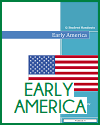Workbook #14 -
The New Conservatism & a New World Order |
| This particular workbook covers the presidencies of Ronald Reagan and George H.W. Bush, and includes topics such as U.S. intervention in Latin America, NAFTA, and the growth of the conservative movement. This is 24 pages in length. The answer key is below. Click here to print. |
 |
 |
|---|
1 A Society in Transition 1. Service jobs (e.g., retail clerks, office workers, teachers, physicians, and government employees) 2. Service-sector activity benefited; hardware and software could aggregate previously unimagined amounts of data about economic and social trends 3. Apple 4. Japan 5. The percentage of family households dropped; a quarter of all groups were now classified as "nonfamily households" in which two or more unrelated persons lived together 6. Asia and Latin America 7. AIDS (Acquired Immune Deficiency Syndrome) 2 Conservatism and the Rise of Ronald Reagan 1. Crime and racial polarization in many urban centers, challenges to traditional values, and the economic downturn and inflation of the Carter years 2. Limited government, strong national defense, and the protection of traditional values 3. Fundamentalist Christians concerned about crime and sexual morality 4. Roe v. Wade 5. "Old Right" favored strict limits on government intervention in the economy; "New Right" determined to wield state power to encourage its views 6. Ronald Reagan 7. Sought to abolish many regulations affecting the consumer, the workplace, and the environment; law should be strictly applied against violators; fired striking air transportation controllers 3 The Economy in the 1980s 1. Holds that a greater supply of goods and services, made possible by measures to increase business investment, is the swiftest road to economic growth 2. Answers will vary 3. Rising oil prices pushed up costs; worldwide economic slump in 1980 reduced the demand for agricultural products; production increasingly became concentrated in large operations 4. Increased military budget combined with the tax cuts and the growth in government health spending 5. Consumer spending increased, the stock market climbed, and the GNP (Gross National Product) grew 6. The large U.S. international trade and federal-budget deficits, the high level of corporate and personal debt, and new computerized stock trading techniques that allowed instantaneous selling of stocks and futures 7. Answers will vary 4 Foreign Affairs 1. He sought a more assertive role for the U.S. 2. Economic aid and military training to stop an insurgency; actively encouraged the transition to an elected democratic government 3. Military aid to the contras that helped to oust the Sandinistas 4. George H.W. Bush 5. Controversial policy of "constructive engagement," quiet diplomacy coupled with public endorsement of reform, later followed by economic sanctions 6. U.S. troops in Grenada captured hundreds of Cuban military and construction personnel and seized caches of Soviet-supplied arms 7. U.S. attempted to bolster a weak but moderate pro-Western government; 241 U.S. Marines were killed in a terrorist bombing in October 1983 8. Reagan administration secretly sold arms to Iran in an attempt to resume diplomatic relations with the hostile Islamic government and win freedom for American hostages held in Lebanon by radical organizations that Iran controlled; investigation revealed that funds from the arms sales had been diverted to the Nicaraguan contras during a period when Congress had prohibited such aid 9. Answers will vary |
5 U.S.-Soviet Relations 1. The suppression of the Solidarity labor movement in Poland in December of 1981, and the destruction of a Korean airplane (269 killed) by a Soviet jet fighter on September 1, 1983 2. Research program to explore advanced technologies, such as lasers and high-energy projectiles, to defend against intercontinental ballistic missiles 3. Provided for the destruction of this entire category of nuclear weapons 4. Answers will vary 6 The Presidency of George H.W. Bush 1. George H.W. Bush 2. Found himself squeezed between a large budget deficit and a deficit-reduction law 3. New federal standards on urban smog, automobile exhaust, toxic air pollution, and acid rain; legislation requiring physical access for the disabled; campaign to encourage volunteerism 7 Budgets and Deficits 1. Reagan's deregulation of the banks led banks to make riskier loans; increase in the government's deposit insurance led consumers to invest their savings in less-sound institutions; fraud, mismanagement, and the choppy economy produced widespread insolvencies among these thrifts 2. Umbrella term for consumer-oriented institutions like savings and loan associations and savings banks 3. Administration budget projections were far too optimistic, and meeting the deficit-reduction law would require tax increases and sharper cuts in defense spending 8 End to the Cold War 1. Communist governments in one Eastern European country after another simply collapsed, after it became clear that Russian troops would not be sent to prop them up 2. President of the Russian republic who foiled an attempted coup d'etat by Soviet hardliners; he forced the dissolution of the Soviet Union 3. Germany 4. The disposal of nuclear materials and the ever-present concerns of nuclear proliferation 9 The Gulf War 1. Kuwait 2. Saddam Hussein 3. Kurds in the north and Shiites in the south 4. The Gulf War enabled the United States to persuade the Arab states, Israel, and a Palestinian delegation to begin direct negotiations aimed at resolving the complex and interlocked issues that could eventually lead to a lasting peace in the region 10 Panama and NAFTA 1. Panama 2. Panamanian dictator who was deposed by the U.S. invasion 3. Drug trafficking and racketeering 4. North America Free Trade Agreement 11 Third-party and Independent Candidates 1. A single issue or set of issues 2. Progressive or Bull Moose Party; formed from the Progressive wing of the Republican Party 3. Eugene Debs 4. Progressive; platform of nationalizing railroads and the country's natural resources, increased taxation on the wealthy, and the right of collective bargaining 5. Opposition to the Cold War, the Marshall Plan, and big business; end discrimination against African Americans and women; minimum wage 6. Continuing racial segregation and the "Jim Crow" laws that sustained it 7. George Wallace 8. Capitalized on popular dissatisfaction with the major parties and the federal government 9. Answers will vary |









